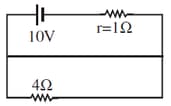Cells, EMF, Internal Resistance
Cells, EMF, Internal Resistance: Overview
This Topic covers sub-topics such as Electric Cell, Potential Difference across Battery Terminal in Open Circuit, Difference between Emf of Cell and Potential Difference across Cell and, Potential Difference across Terminals of Battery Getting Charged
Important Questions on Cells, EMF, Internal Resistance
Assertion: When a battery is short-circuited, the terminal voltage is zero.
Reason: In the situation of a short-circuit, the current is zero
The potential difference across the terminals of the cell when the battery is short-circuited is zero.
When a battery is short-circuited, the terminal voltage is zero
The terminal potential difference of a cell when short-circuited is (E=EMF of the cell)
The terminal voltage of a cell in open circuit condition _____is its emf.
Can the terminal voltage of cell be greater than the emf of a cell?
A storage battery of emf with internal resistance is being charged by a supply using a series resistor of What is the terminal voltage of the battery during charging?
Assertion: In a simple battery circuit the point at the lowest potential is positive terminal of the battery.
Reason: The current flows towards the point of the lowest potential, as it does in such a circuit from negative to the positive terminal.
Potential difference across the terminals of the battery shown in figure is (internal resistance of battery)

In the circuit shown figure potential difference between and will be
A battery of emf 2V and internal resistance 0.1 is being charged by a current of 5A. The potential difference between the terminals of the battery is

